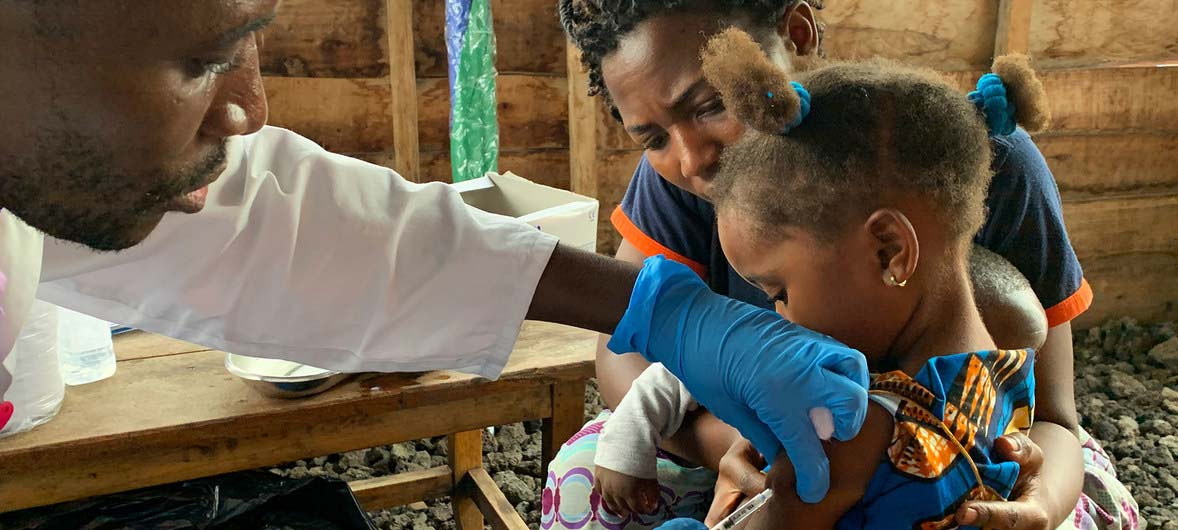COVID-19 versus routine immunisation in the Democratic Republic of Congo
Health workers, community leaders and the Ministry of Health are hard at work trying to contain the damage COVID-19 is causing routine immunisation in the DRC.
- 10 August 2021
- 4 min read
- by Victor Muisyo

Close to 23 million children missed out on routine vaccinations in 2020 due to the COVID-19 pandemic, the highest number in more than a decade, according to recent WHO/UNICEF data.
Before the pandemic, routine immunisation coverage in the Democratic Republic of Congo was increasing steadily. However, as in countries around the globe, the pandemic has risked shifting attention away from familiar killers like measles and polio towards the new pandemic threat. There is concern that the temporary interruption of basic health-care delivery, including routine immunisation services, may lead to a secondary health crisis.
"We are not refusing that our faith is our protection but we also need to understand that we need to protect ourselves”
Twenty-nine-year-old health worker Jean-Marie Lualua, based in Keshero township some nine kilometres west of Goma city, sheds light on the official position on routine immunisation amidst the pandemic.
“The Minister of Public Health Dr Eteni Longondo has taken important actions to address immunisation and reduce the number of zero-dose children,” she says. “Most people feared that they would contract the virus while visiting healthcare places, or be exposed to contamination. In addition, there were rumours that a COVID-19 vaccine was being tested in healthcare centres.”

Credit: Global Polio Eradication Initiative
Disinformation has been one of the greatest challenges. “To combat this, we started moving from one home to another to create awareness so that we can avoid devastating consequences on a population with so many children at the age where they require this immunisation,” says Jean Remi Bahati, a health worker in Buhumba, a township 23 kilometres north of Goma.
Another significant obstacle is distance. Colombe Kinouani from the village of Moba, Katanga, says she has to trek a long distance to reach a healthcare centre to secure vaccines for her baby. Her desire to get the vaccines is great, but hampered by the distance and effort that accessing them demands.
Heath worker Lualua is sympathetic to Colombe’s plight: “When these villagers want their children to be vaccinated, they have to go on a two hour journey. They live in very rural areas and there are security issues that scare health workers. Imagine the long walk without food to sustain the journey.”
Have you read?
Congo is among the top 10 countries with the highest number of unimmunised 'zero-dose' children. Health workers are actively pursuing a number of initiatives to reach and vaccinate zero-dose children, such as engaging local and community leaders to promote the importance of immunisation and door-to-door campaigns to encourage parents to have their children immunised. Engaging the community is key to putting an end to vaccine resistance and misinformation, while other health workers map refusal to help target advocacy.

Credit: UN NEWS
Outreach workers are also being taught active listening techniques, which enable them to address the concerns of vaccine-resistant leaders.
"We are not refusing that our faith is our protection but we also need to understand that we need to protect ourselves,” says Etienne Makiadi Mafuta, a local religious leader in Mukwaka who three years ago used to resist polio vaccinations for his children. “Opinions and beliefs change with time and now we have different views about vaccination so when we get sick, we visit hospitals."
In another village in Kimvula, the traditional chief Marco Kiambukuta says he regularly brings together parents in his compound for an educational chat. During such sessions, parents ask questions and raise their concerns.
Other outreach activities include public debates where whole communities participate, street theatre, door-to-door counselling, and radio and television public service announcements.
These efforts are having an effect.
Technology is also being put into good use through the Mashako Plan app (formally known as the Emergency Plan for Revitalisation of Routine Immunisation in the DRC), supported by Gavi. The app was launched in October 2018 to tackle extremely low rates of routine immunisation coverage. The application helps health workers monitor immunisation sessions, vaccine stocks and cold chain performance in real time. Data obtained via the app is fed into a national dashboard to help inform rapid and evidence-based action at the Ministry of Health level.
Even though COVID-19 has greatly impacted routine immunisation in the Democratic Republic of Congo, multiple efforts to contain the effects of the pandemic have been put in place to ensure that other vaccines are still accessible and continue to be administered even as the country's healthcare systems grapple with the pandemic.
More from Victor Muisyo
Recommended for you









